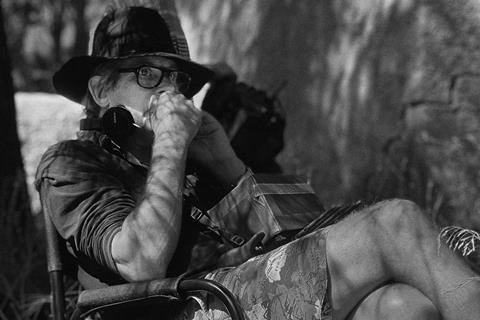
Swimming Home is an adaptation of Deborah Levy’s 2011 novel, written and directed by debut UK flmmaker Justin Anderson.
The UK-Dutch co-production premiered in the Tiger competition of this year’s International Film Festival Rotterdam (IFFR).
The film centres around a war reporter played by Mackenzie Davis, on a family holiday with her husband (Christopher Abbott), a poet, and their teenage daughter. Returning home to their villa with a friend (Nadine Labaki) they find a naked stranger, Kitti (Ariane Labed) floating in the pool. Invited to stay, Kitti’s presence comes to emphasise the tensions within the family.
Anderson studied fine art at the Slade School in London and at the Rijksakademie Van Beeldende Kunsten in Amsterdam. He is an exhibited artist and has directed music videos, commercials and won numerous awards in fashion.
Swimming Home is produced by Andy Starke of Anti-Worlds, Emily Morgan of Quiddity Films and Giorgos Karnavas of Greece’s Heretic. The co-producers are Paula Linhares and Marcos Tellechea of Brazil’s Reagent Media and Leontine Petit and Erik Glijnis of Dutch outfit Lemming Film. Bankside has international sales.
Anderson talked to Screen at IFFR about being matched with his producer by Yorgos Lanthimos, how his therapist helped develop the characters and why he was inspired by “French films about trouble in beautiful spaces”.
Why did you want to make Swimming Home as your feature debut?
[A few years ago] I made a short film inspired by Pasolini’s Teorema about a bourgeois family having dinner when a naked guy gets out of the pool and stands in the window. You find out first that the wife has had a thing with him, and the daughter, the son, and the husband. A friend saw it and said you should read this book by Deborah Levy, it’s spookily similar.
I read the book, and I was like, ‘wow.’ It was very cinematic and reminded me of [Jacques Deray’s] La Piscine and [Rohmer’s] Pauline At The Beach or La Collectionneuse, French films about trouble in beautiful spaces. But also, I found the characters quite confounding. I thought it was very radical to write a book with characters whose motives you can’t really understand.
I sent my short film to Deborah [and got a message back from her] saying, ’Let’s have lunch’. She just said, ‘What do you want to do with my book? And I said I recently watched Orpheus by Jean Cocteau and that I wanted to make a Jean Cocteau film out of it. She came from an art background too, so we just immediately started getting on.
What happened next?
She offered me the option [in 2014]. And we started going on walks together, where we talked about characters as if they were people. I also went to see my old analyst and I gave him the novel. We did analysis on the characters. I recorded the conversations – we call them the shrink tapes. That really helped shape the characters.
And how did you get it produced?
Very slowly. To begin with, I had a few other producers who for one reason or another [left the project]. Ariane Labed is an old friend of mine [they had worked together on an Armani ad campaign]. She’d just moved to London with [her husband] Yorgos Lanthimos. At a certain point, I gave Yorgos the script and asked ‘Who do you think would be a good producer for this?’ And he said, ‘Do you know Peter Strickland’s work? His producer is Andy Starke, and I think he’d be right for this project.’
So Yorgos sent an email to Andy. We met on a beach in Dorset. I remember it really well; he said, “Well, let’s do what we say and see where we get.”
He sent me to LA to meet agents. I went to CAA one day, then to WME and UTA. We just did this whole agent thing. It was the most unbelievably right and interesting thing to do. Because when a script arrives, they need to know who you are. And the way you’re going to get financed, as a first time director, is that you need actors. And the key to getting actors is getting agents. That’s how you unlock the process. But it was tough, it took a long time. We just kept going.
Were there any other key figures in getting it made?
Absolutely. [Quiddity Films producer] Emily Morgan came on board. We were about to go to Brazil to go and recce it, and then the pandemic hit. [During the pandemic] we spent about a year grinding the script.
How did the cast come together?
The first person who came on board was Ariane, then it was Chris Abbott. Then we had McKenzie. We sent Nadine Labaki the script and she just said yes, straight away. I was so flabbergasted, excited, terrified, all sorts of things. She came in, and she was fantastic and very generous.
Why did you choose to shoot in Greece?
Emily had shot with [Greek co-producers] Heretic before. Then I started going to Greece and I had that friendship with Yorgos. He recommended the DOP Simos Sarketzis who he was at film school with. Also, just having Ariane was really important. She’s an exec producer on the film - she’s somebody I shared the script with for a long time. She was a very big part of it.
Tell us about your approach to making the film
I wanted to have fun. There’s an element of playfulness in the film. I wanted to make a film where I wasn’t afraid to have a go. The cast felt that too. The way that we frame things, how the music plays, and the dance and the choreography, I’m playing with lots of things in the way that that Jean Cocteau does. I also wanted to make a film that could dig around in the trauma that surrounds our comfortable and secure lives and ask questions about ourselves.

























No comments yet